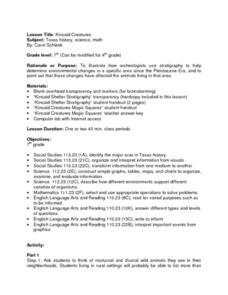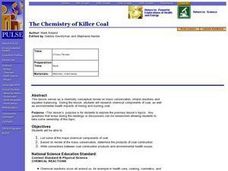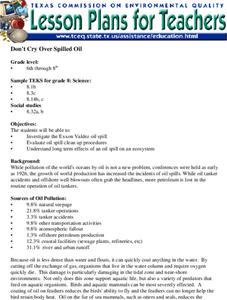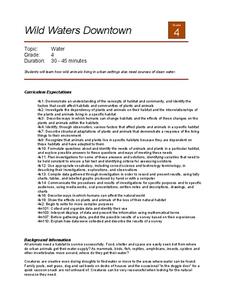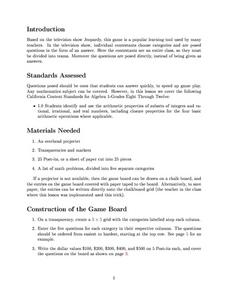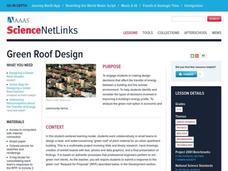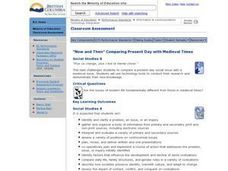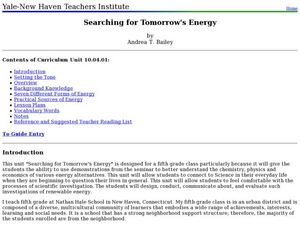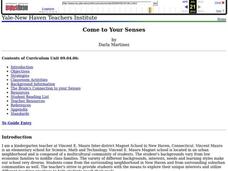Curated OER
Rivers And Capitals
Pupils become familiar with the use of GIS for research and become aware of the importance of rivers to cities. They also analyze the placement of cities and learn the names of rivers in the United States.
Curated OER
The Chemistry of Coal
Students investigate the chemistry of coal. This lesson serves as a review of conservation of mass, simple reactions and equation balancing. During the lesson, students research chemical components of coal, as well as environmental...
Curated OER
Transport
Students analyze wind barbs and determine which way the wind is blowing and how hard the wind is blowing. They access near real time wind data and pollutant animations to track the transport and destination of pollutants.
Curated OER
Kincaid Creatures
Students brainstorm a list of nocturnal and diurnal wild animals they see in their community and discuss how the animals would be different if they were living during the Ice Age. Using a handout, they discover how archeologists record...
Curated OER
Saving Hawaii
Students engage in a lesson about the a proposal for a sanctuary in the Northwestern Hawaiian Islands. They write a letter to the President of The United States in opposition to the proposal based upon classroom activities and research.
Curated OER
The Chemistry of Killer Coal
Students research chemical components of coal, as well as environmental health impacts of mining and burning coal. They discuss conservation of mass as it relates to combustion of organic compounds.
Curated OER
A Sense of West Virginia
Students consider their perceptions of the world through their 5 senses while visiting the West Virginia State Museum. In this West Virginia history lesson, students discover how knowing about the past helps with their understanding of...
Curated OER
Land Use and Nitrogen
Students consider the effects of development on water quality. They test nitrogen levels in waters before and after development, investigate wastewater treatment options and research best management practices to reduce nitrogen loads.
Curated OER
Don't Cry Over Spilled Oil
Pupils study the Exxon Valdez Oil Spill while evaluating oil spill clean up activities. They discover the long term impact can have on an ecosystem by completing this experiment.
Curated OER
Wild Waters Downtown
Fourth graders investigate how wild animals living in urba settings also need sources of clean water. They discuss the open water issues of West Nile Virus and what happens to urba animals as these poolings area are cleaned up. ...
Curated OER
Make Way for Wild Migrants
Students discuss the threats facing migratory species and track the seasonal journeys of wildlife in real space and in cyberspace. Once they have gathered information from several sources, they create a portfolio to share with others...
Curated OER
Farm Animal Friends
Students apply basic communication and math skills to situations. They apply prior knowledge to list characteristics of different animals. They listen to music to engage multiple senses. Then images of animals are shared with them to...
Curated OER
Freshwater Fish and Fish-keeping
In this online quiz worksheet, students answer a set of questions about freshwater fish. Answers may be submitted for review by clicking a link at the bottom of the page.
Curated OER
Mathematical Jeopardy
Middle schoolers use the popular game of Jeopardy to explore different mathematical concepts. They are highly engaged with the use of technology for this lesson. They function using higher-order thinking skills in order to create their...
Science NetLinks
Green Roof Design
Green roofs aren't just eco-friendly — they are literally green with trees. Groups learn about the concept of green roofs in order to be able to design one. The groups design a 5,000-square-foot green roof for a fictional apartment row...
Curated OER
Lights, Sounds, Fabrics and Designs: Careers in the World of Design
Students investigate the broad range of jobs that can be found in the world of design. Students explore sound design, language architecture, etc. Students design a resource book and post it on a website for others to share.
Curated OER
"Now and Then" Comparing Present Day with Medieval Times
Eighth graders compare a present-day social issue with a medieval issue. They use technology tools to conduct their research and demonstrate their new knowledge. Students present their findings to the class in the form of a PowerPoint.
Curated OER
Ecology Explorers: Historical Air Photo Interpretation
Learners identify and analyze land use changes over time with historic aerial photographs, and classify different land use into categories.
Curated OER
Searching for Tomorrow's Energy
Fifth graders investigate energy. In this biology lesson plan, 5th graders will learn about energy, fossil fuels, and renewable and nonrenewable resources. Students will be participating in three lab activities which are described in...
Curated OER
The Immigrant Experience In America
Students study immigration, Ellis Island, and tenement life from 1890 to 1924. Each student create an identity of an immigrant and write an essay in the first person. Essays describe what they found when they arrived in New York City.
Curated OER
Food for Thought
Fifth graders explore the brain and what is needs. In this biology lesson plan, 5th graders will work on a series of activities that will allow them to learn about the brain, its parts, and the best foods to eat for their brain.
Curated OER
Come to Your Senses
Students explore their senses. For this biology lesson plan, students will learn about their senses, what affects them, and how the brain works to control our senses in a series of lab activities.
Curated OER
Teaching the Five Themes of Geography Through Picture Books
Read the story Make Way for Ducklings and introduce little ones to the five themes of geography. Reread the story, while displaying transparencies to reinforce the five themes. In groups, learners view pictures and identify the themes on...
Curated OER
Lesson Plan on Indigenous Children
Students explore indigenous, traditional and tribal cultures--their rights, protections by law, and obstacles as a people. In groups, they form their own activist groups to contribute to the global effort to preserve indigenous cultures.





